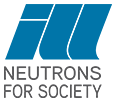Scientific groups
Instrument Groups | Description | Instruments | |
|---|---|---|---|
| The DIF instruments use neutron diffraction to study the structure of materials used in everyday life. | Powder diffractometers: D2B, D20, D1B (CRG), D4, SALSA, D7 | Single-crystal diffractometers: | |
| The LSS instruments are all dedicated to measuring structures on the scale of 1 to 100s of nanometers. | Large-scale structure diffractometers: D11, D16, D22, D33, LADI-III | ||
| The NPP instruments are excellent unique tools for examining key questions in nuclear and neutron particle physics. | PF1B, PF2, PN1, PN3, S18 (CRG), FIPPS, GRANIT (Jointly funded instrument) | ||
| The Spectroscopy instruments are used to study the dynamics of condensed matter samples, either in the form of powders, glasses or liquids. Some are designed, primarily, to investigate the collective motion of atoms and that of their magnetic moments in single crystalline samples. | Time of Flight spectrometers: Three-axis spectrometers: | High-resolution spectrometers: Options: |
Other Groups | Description | ||
|---|---|---|---|
C-Lab and Virtual Experiments | The Computation Lab (C-Lab) hosts scientists and students who need to perform instrument and sample simulations. The Lab brings a broad spectrum of experience and tools to the site of the experiment. Simulation support can be requested along with neutron beamtime requests; the simulations accepted are performed by visitors in collaboration with the C-Lab. | ||
The Theory Group works with ILL/ESRF users to help them understand | |||
The Life Sciences Group is located in the Carl-Ivar Brändén Building (CIBB) and focuses on the study of macromolecular systems using the wide range of technology platforms available in the Partnership for Structural Biology, including neutron and X-ray diffraction. The group has advanced capabilities in molecular biology, biochemistry, isotope labelling, and contains a dedicated Deuteration Laboratory (D-Lab) for which user access can be sought through a rapid peer-review proposal system. The group has a number of in-house interests, many of which are collaborative with member of the international user community. These include host-pathogen interactions (eg malaria, HIV), amyloidogenic systems, as well as technical developments for selective and non-selective isotope labelling of proteins, peptides, nucleic acids etc. | |||
The Soft Matter Science and Support (SMSS) group is located in the Science Building and has the responsibility for running the Chemistry Laboratories, on the first floor, and the Partnership for Soft Condensed Matter (PSCM) initiative on the second floor. It operates in close collaboration with the LSS group. Besides the laboratory responsibles it hosts a large number of PhD students and post-docs either with ILL or external grant fundings working on soft matter science using neutron scattering. It has also the responsibility for setting up a deuterated lipid extraction facility currently funded by the SINE2020 grant and in collaboration with the D-Lab. | |||
When you come at the ILL for an experiment or a scientific collaboration, remember you can give a seminar about your work. Choose the College that bests suits your activity, and benefit from our financial support for speakers. This is a nice way to fund your stay and communicate with the ILL scientists and users.
